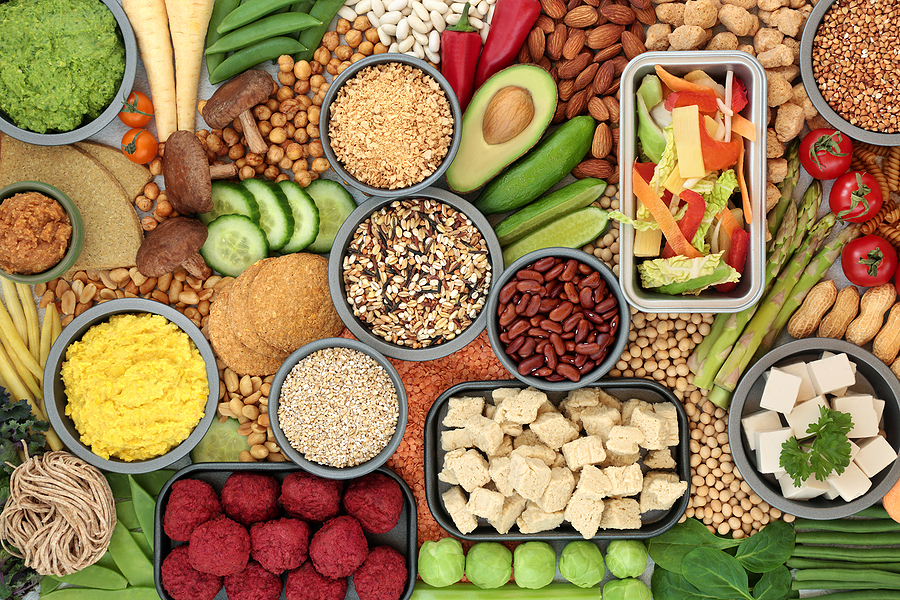Everything About Healthy And Balanced Food: Advantages of Checking Out Plant Based Alternatives
The conversation surrounding plant-based diet plans has acquired significant focus over the last few years. Several people are checking out the potential health benefits, dietary benefits, and environmental influences related to these dietary choices. As individuals come to be extra knowledgeable about their food's influence on well-being and sustainability, inquiries develop regarding the practicalities of adopting such a way of living. What certain changes can one expect, and just how might these options reshape not just personal wellness however also the earth's future?
Comprehending Plant-Based Diets
Several people link plant-based diet plans mostly with vegetarianism or veganism, these diet plans can incorporate a broad array of eating patterns that focus on whole, minimally processed plant foods. Such diet regimens typically consist of fruits, vegetables, entire grains, nuts, legumes, and seeds, while restricting or eliminating animal products. This adaptability allows individuals to customize their nutritional choices according to individual choices and nutritional requirements. Some may adopt a largely plant-based diet plan while still occasionally consuming meat or milk, commonly referred to as a flexitarian method. The emphasis continues to be on incorporating more plant foods, which can cause a varied array of meals and flavors. Understanding these various interpretations of plant-based consuming is crucial for appreciating its ease of access and charm in modern food society.
Wellness Benefits of Plant-Based Foods
The health benefits of plant-based foods are significant, providing a nutrient density advantage that supports overall wellness. Research study suggests that these foods can enhance heart health and wellness and play a necessary duty in reliable weight monitoring. By incorporating much more plant-based choices, individuals may improve their dietary options and promote lasting wellness.
Nutrient Thickness Advantage
Nutrient density plays an important role in the health benefits of plant-based foods, making them an engaging selection for those looking for a balanced diet regimen. Plant-based foods, such as fruits, vegetables, vegetables, nuts, and whole grains, are commonly abundant in crucial vitamins, minerals, and anti-oxidants while being lower in calories. This high nutrient density allows people to take in fewer calories while still meeting their dietary requirements. Furthermore, these foods are packed with nutritional fiber, advertising digestion health and wellness and aiding in weight monitoring. By integrating nutrient-dense plant-based choices, customers can improve their overall wellness, sustain their immune systems, and reduce the threat of chronic conditions. Eventually, the nutrient density of plant-based foods emphasizes their value in a health-conscious lifestyle.
Heart Wellness Enhancement

Weight Monitoring Assistance
In enhancement to promoting heart wellness, a plant-based diet plan can considerably assist in weight management. This nutritional method stresses whole foods such as fruits, veggies, vegetables, nuts, and entire grains, which are typically reduced in calories and higher in fiber contrasted to animal-based products. The high fiber material helps boost satiation, minimizing total calorie intake. In addition, plant-based diet plans are usually rich in crucial nutrients while low in harmful fats, making it easier to preserve a healthy and balanced weight. Sugar Free Sauces. Study indicates that individuals that take on a plant-based lifestyle have a tendency to have reduced body mass indexes (BMIs) and experience even more effective weight reduction compared to those that eat meat-heavy diet plans. Subsequently, embracing plant-based options is a calculated selection for reliable weight management
Nutritional Worth of Plant-Based Active Ingredients
Plant-based active ingredients are abundant in important nutrients, providing a diverse range of vitamins, minerals, and antioxidants that add to general health and wellness. A contrast of protein resources exposes that while animal products are typically checked out as remarkable, several plant-based alternatives give ample healthy protein and various other helpful compounds. Comprehending the nutritional value of these ingredients can aid people make notified dietary choices.
Important Nutrients in Plants
Nutrient-rich ingredients located in plants supply a varied range of vital minerals and vitamins that contribute significantly to overall wellness. These components are rich in vitamins A, C, and K, which support immune feature, vision, and blood clotting, respectively. Furthermore, plants supply essential minerals such as potassium, magnesium, and calcium, crucial for heart wellness, muscle mass function, and bone stamina. The presence of fiber in plant-based foods help digestion and advertises a healthy gut microbiome. Anti-oxidants, found perfectly in veggies and fruits, assistance fight oxidative anxiety and decrease swelling. Several plant foods are low in calories yet high in nutrients, making them a superb choice for those looking for to maintain a healthy weight while making certain perfect nutrient consumption.

Comparing Protein Resources
Healthy protein resources vary significantly in their nutritional accounts, with plant-based active ingredients supplying one-of-a-kind benefits. Unlike animal healthy proteins, which often contain hydrogenated fats and cholesterol, plant healthy proteins have a tendency to be lower in these harmful elements. Legumes, nuts, seeds, and whole grains are abundant in crucial amino acids, fiber, vitamins, and minerals. For circumstances, lentils supply high protein web content along with considerable iron and folate, while quinoa is a complete healthy protein, providing all 9 crucial amino acids. In addition, plant-based proteins are usually gone along with by antioxidants and phytochemicals that sustain general health. The change to plant-based protein resources not only improves nutritional intake yet likewise straightens with sustainable nutritional practices, lowering environmental effect and advertising long-lasting wellness benefits.
Ecological Impact of Plant-Based Consuming
As awareness of environment adjustment grows, several individuals are checking out lasting dietary options that can greatly reduce their environmental impact. Plant-based consuming has emerged as a substantial contributor to minimizing greenhouse gas exhausts, which are mainly connected with animals production. The growing of fruits, grains, vegetables, and vegetables typically needs less sources, such as water and land, contrasted to pet farming. Additionally, plant-based diets can cause lowered logging, as much less land is required for grazing animals or growing animal feed. By shifting towards advice plant-based choices, consumers can support biodiversity and promote healthier environments. On the whole, welcoming plant-based consuming not just advantages individual wellness yet additionally stands for an essential action towards ecological sustainability and preservation initiatives.
Conquering Common Misconceptions
While lots of individuals acknowledge the benefits of a plant-based diet, several misunderstandings commonly prevent them from fully embracing this lifestyle. A common idea is that plant-based diet regimens do not have adequate healthy protein; nevertheless, many plant sources, such as legumes, nuts, and tofu, provide ample healthy protein. In addition, some presume that this diet plan is expensive, when as a matter of fact, staples like beans, rice, and seasonal veggies can be rather cost effective. One more misunderstanding is that plant-based eating is extremely limiting, whereas it actually offers a varied range of tastes and foods. Several fret that a plant-based diet might lead to deficiencies, yet with appropriate planning, people can obtain all needed nutrients, including minerals and vitamins, while enjoying a vast variety of tasty meals. Large Tips for Transitioning to a Plant-Based Lifestyle
Making the change to a plant-based lifestyle can be an enhancing experience, though it often needs some guidance to navigate the first modifications. Individuals are urged to begin gradually, integrating even more fruits, vegetables, legumes, and entire grains right into their dishes while decreasing meat and dairy products intake. Dish planning is necessary; preparing an once a week food selection can aid ease the modification and stop final unhealthy choices. Exploring cooking techniques and brand-new dishes can additionally maintain and enhance the experience enjoyment regarding plant-based consuming. In addition, signing up with support system or areas can provide motivation and share valuable suggestions. Staying informed concerning nourishment warranties well balanced dishes, stopping deficiencies while fostering a healthy, satisfying plant-based lifestyle.

Delicious Plant-Based Meal Concepts
Exploring delicious plant-based meal ideas can influence individuals to accept a much more healthy diet plan. One popular alternative is a passionate quinoa salad, featuring cherry tomatoes, cucumber, and a spicy lemon-tahini clothing. Another favorite is a full-flavored lentil stew, loaded with carrots, celery, and fragrant herbs, excellent for a comforting dinner. For breakfast, over night oats made with almond milk, chia seeds, and covered with fresh berries provide a nutritious begin to the day. Furthermore, a vivid veggie stir-fry with tofu and a variety of colorful veggies can be a quick yet satisfying meal. Creamy avocado Look At This toast on whole-grain bread, sprinkled with flavors and seeds, provides a basic yet delicious treat. These dishes display the range and splendor of plant-based consuming.

Regularly Asked Concerns
Can a Plant-Based Diet Give Sufficient Protein?
The inquiry of whether a plant-based diet plan can provide enough protein is common. Many sources, consisting of vegetables, nuts, seeds, and entire grains, can satisfy protein requires efficiently, sustaining a healthy and well balanced diet plan for people.
Are Plant-Based Diet Plans Suitable for Children?
The viability of plant-based diet plans for youngsters depends upon mindful planning. Ample nutrients should be assured, including vitamins, healthy proteins, and minerals. With proper support, such diet plans can sustain healthy and balanced growth and advancement in kids.
Exactly how Do I Dine Out on a Plant-Based Diet regimen?
Eating in restaurants on a plant-based diet regimen entails looking for restaurants with varied food selections, requesting for alterations, and exploring vegan-friendly alternatives. Planning in advance and interacting dietary choices can enhance the dining experience while maintaining nutritional selections.
What Are Common Irritants in Plant-Based Foods?
Common allergens in plant-based foods include soy, gluten, nuts, and seeds - Plant Based Beef. Individuals complying with a plant-based diet regimen must recognize these irritants and read tags meticulously to prevent negative responses and guarantee secure usage
Can Plant-Based Diets Assist With Weight Loss?
Research study indicates that embracing a plant-based diet regimen might assist in weight reduction due to its generally lower calorie thickness and higher fiber material. This mix can boost satiety, assisting people handle their calorie intake effectively. Lots of people link plant-based diets mostly with vegetarianism or veganism, these diet regimens can include a wide range of eating patterns that focus on entire, minimally refined plant foods. Nutrient thickness plays an important role in the health and wellness advantages of plant-based foods, making them a compelling selection for those seeking a balanced diet plan. Plant-based diets have actually been shown to noticeably enhance heart health and wellness, check my source as they usually have aspects that support cardiovascular feature. In addition to promoting heart wellness, a plant-based diet plan can significantly aid in weight monitoring. A typical belief is that plant-based diets do not have adequate healthy protein; nevertheless, various plant resources, such as vegetables, nuts, and tofu, offer ample healthy protein.